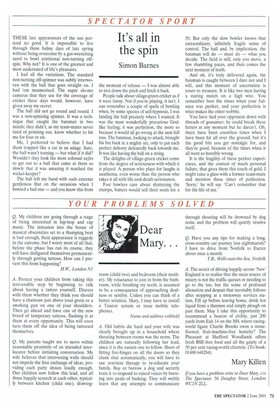It's all in the spin
Simon Barnes
THESE late appearances of the sun portend no good. It is impossible to live through these balmy days of late spring without being overcome by a gut-wrenching need to bowl attritional non-turning offspin. Why not? It is one of the greatest and most underrated of life's pleasures.
I had all the variations. The standard non-turning off-spinner was subtly interwoven with the ball that goes straight on. I had 'em mesmerised. The super slo-mo cameras that they use for the coverage of cricket these days would, however, have given away my secret.
The ball did not go round and round. I was a non-spinning spinner. It was a technique that caught the batsman in two minds; they didn't, as my team-mates never tired of pointing out, know whether to hit me for four or six.
Me, I preferred to believe that I had them trapped like a cat in an adage. Sure, the ball wasn't turning — but what if it did? Wouldn't they look the most colossal eejits to get out to a ball that came at them so slowly that it was amazing it reached the wicket-keeper?
The ball left my hand with such extreme gentleness that on the occasions when I bowled a bad one — and you know this from
the moment of release — I was almost able to trot down the pitch and fetch it back.
People talk about village-green cricket as if it were funny. Not if you're playing, it isn't. I can remember a couple of spells of bowling when, by some species of self-hypnosis, I was landing the ball precisely where I wanted. It was the most wonderfully precarious Godlike feeling; it was perfection, the more so because it would all go wrong at the next full toss. The batsman, looking to attack, brought his bat back in a mighty arc, only to pat each perfect delivery defeatedly back towards me. It was like having the ball on a string.
The delights of village-green cricket come from the degree of seriousness with which it is played. A person who plays for laughs is anathema, even worse than the person who takes it all with life-and-death seriousness.
Fast bowlers care about shattering the stumps, batters would sell their souls for a 50. But only the slow bowler knows that extraordinary, infinitely fragile sense of control. The ball and, by implication, the batsman will do — must do — what you decide, The field is still, only you move, a few shambling paces, and then comes the next moment of truth.
And oh, it's truly delivered again, the batsman is caught between I dare not and I will, and this moment of uncertainty is yours to treasure. It is like two men having a staring match on a high wire. You remember best the times when your balance was perfect, and your perfection is what makes the other wobble.
You have tied your opponent down with threads of gossamer: he could break these fetters at any moment but he claren't. Oh, there have been countless times when I have been hit all over the ground, but it's the good bits you get nostalgic for, and they're good, because of the times when it all went so horribly wrong.
It is the fragility of these perfect experiences, and the context of much personal failure, that gives them this touch of gold. I might raise a glass with a former team-mate and mention these times of perfection. 'Sorry,' he will say. 'Can't remember that for the life of me.'










































































 Previous page
Previous page